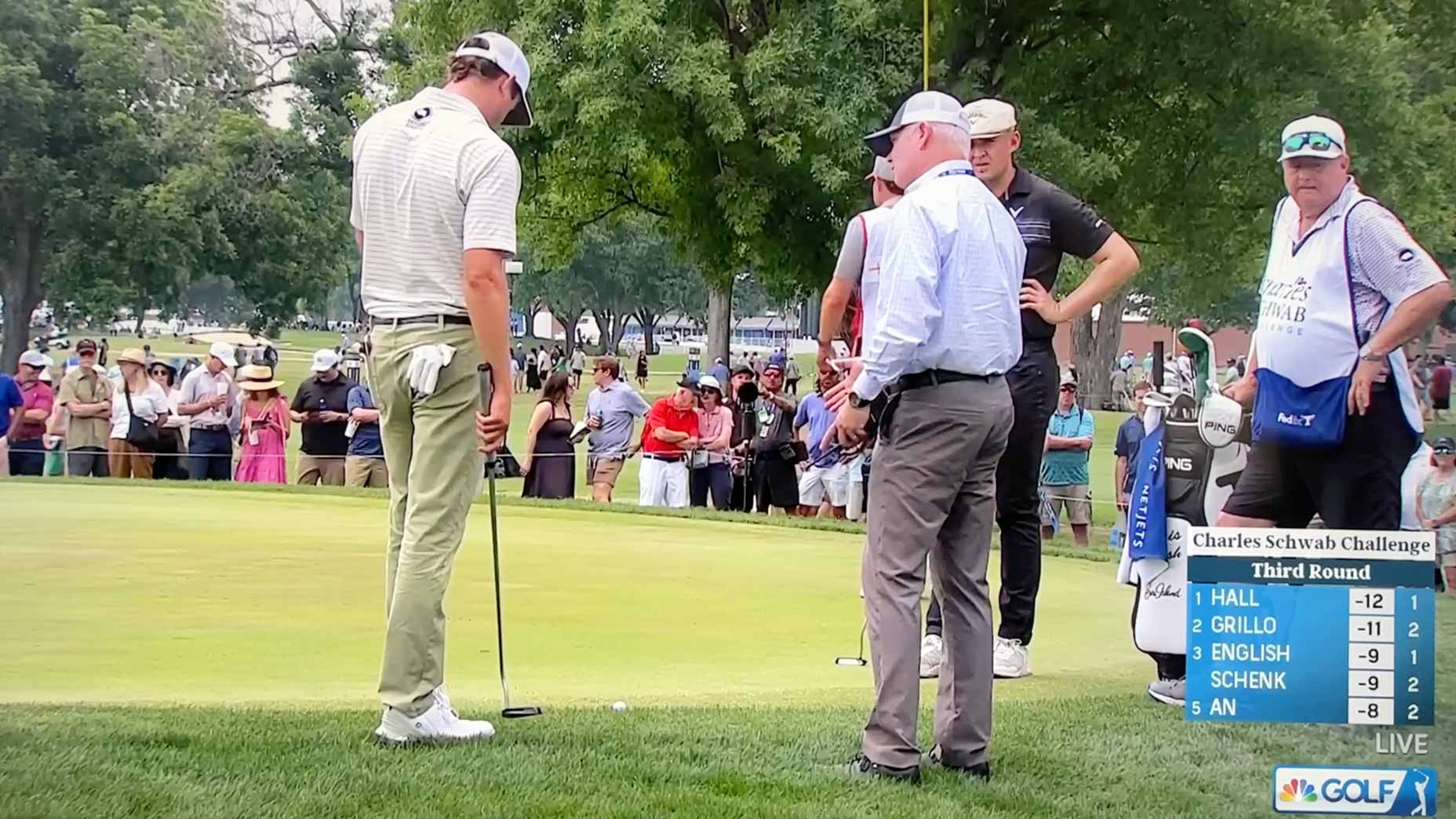Harris English wasn’t certain what score he’d made on the par-4 2nd hole Saturday at the Charles Schwab Challenge until seven holes later.
As English was playing the 9th hole at Colonial Country Club, PGA Tour rules officials alerted him that, after further review, he would not be assessed a penalty after his ball moved on No. 2.
The bizarre rules situation started for English, who began the day in solo second at nine under, three back of Harry Hall, when he was getting ready to hit a birdie putt from just off the 2nd green.
His ball was just 17 feet from the hole but nestled up against the first cut of rough, on the edge of the fringe cut.
Shortly after he’d addressed the ball, he came out of his stance perplexed.
“My ball keeps rolling that way,” English said, pointing in the direction of the hole.
Based on what happened next, English’s wording is key here as he said the ball “keeps” rolling, as in the ball was already moving before he backed off.
Quickly, his caddie, Eric Larson, and playing partner, Hall, came in to try and understand what had just happened.
“Did the ball move on the spot?” Hall asked English.
“It was going that way, yeah,” English said.
Since English was in the “general area” and not on the green, as Hall reminded him, if he had been deemed to have caused the ball to move, he would have to replace his ball with a one-stroke penalty. If he failed to do so, it would be a two-stroke penalty.
It didn’t take long for Tour rules official Dave Donnelly to arrive on the scene and ask English to recount the situation.
“I was taking my practice strokes right here, and I’m kind of looking at the ball a little bit, and (inaudible) is pointed that way,” English said.
“When the ball moved, was the club over there or was it behind the ball?” Donnelly asked.
“When it first moved, it was right here,” English said, placing his putter head beside the ball, as he would to take practice strokes.
This is when Hall and his caddie started to look visibly upset. Hall’s caddie quickly looked at Hall after English claimed that he had seen the ball moving before he addressed it. This is important because if English had not yet addressed the ball and it had started moving, or it was already moving when he addressed it, there would be no penalty and he would play the ball as it lies.
“I was like this and going through my routine,” English said. “I could see it out of the corner of my eye a little bit and I get over it and it’s continuing to do it.”
“What you showed me right there,” Donnelly said. “That could not have caused the ball to trickle like that with you far enough away from it. With that not having caused it to move and you didn’t do anything else to cause it to move, then the ball is just in play where it is.”
When he finally putt, Harris left his birdie try short but was able to convert the three-footer for par. But Hall didn’t appear to agree with the ruling and walked straight over to Donnelly to continue discussing it as Harris sized up his putt.
Mark Dusbabek, another Tour official, further explained the ruling on the Golf Channel broadcast.
“There wasn’t enough evidence there to show that Harris had caused the ball to move,” he said. “Therefore, if you don’t have that virtual certainty, it’s moved by natural forces and you play it from its new position.”
While it seemed the matter had been settled, the broadcast still never showed an angle that showed ball had moved before English addressed it. When English and Hall, who were the final pairing of the day, were on the 6th hole and after the coverage had switched to CBS, Jim Nantz told viewers the Tour would be reviewing video of the ruling with English at the conclusion of the round.
At that point, English was treading water, one over for the round and four back of Hall.
“I think the best way for him to deal with this is to process this like he is going to get a penalty,” analyst Trevor Immelman said. “If he doesn’t, then it’s a bonus.”
“It’s fortunate that it’s Saturday and not the final round,” Frank Nobilo added from the booth.
But English didn’t have to wait long. Three holes later, Nantz reported that English had been cleared of any potential penalty. English birdied the ensuing hole, the 10th, to climb into a share of the lead at 10 under.
He continued to hold a share of the lead for most of the round until a bogey at 18 knocked him back to 9 under and out of the final pairing. A two-over 72 was good enough for Hall to remain in a share of the lead at 10 under with Adam Schenk who will join him in the final grouping Sunday.
